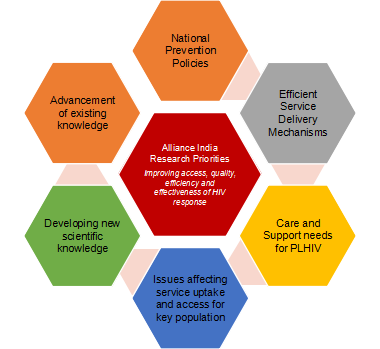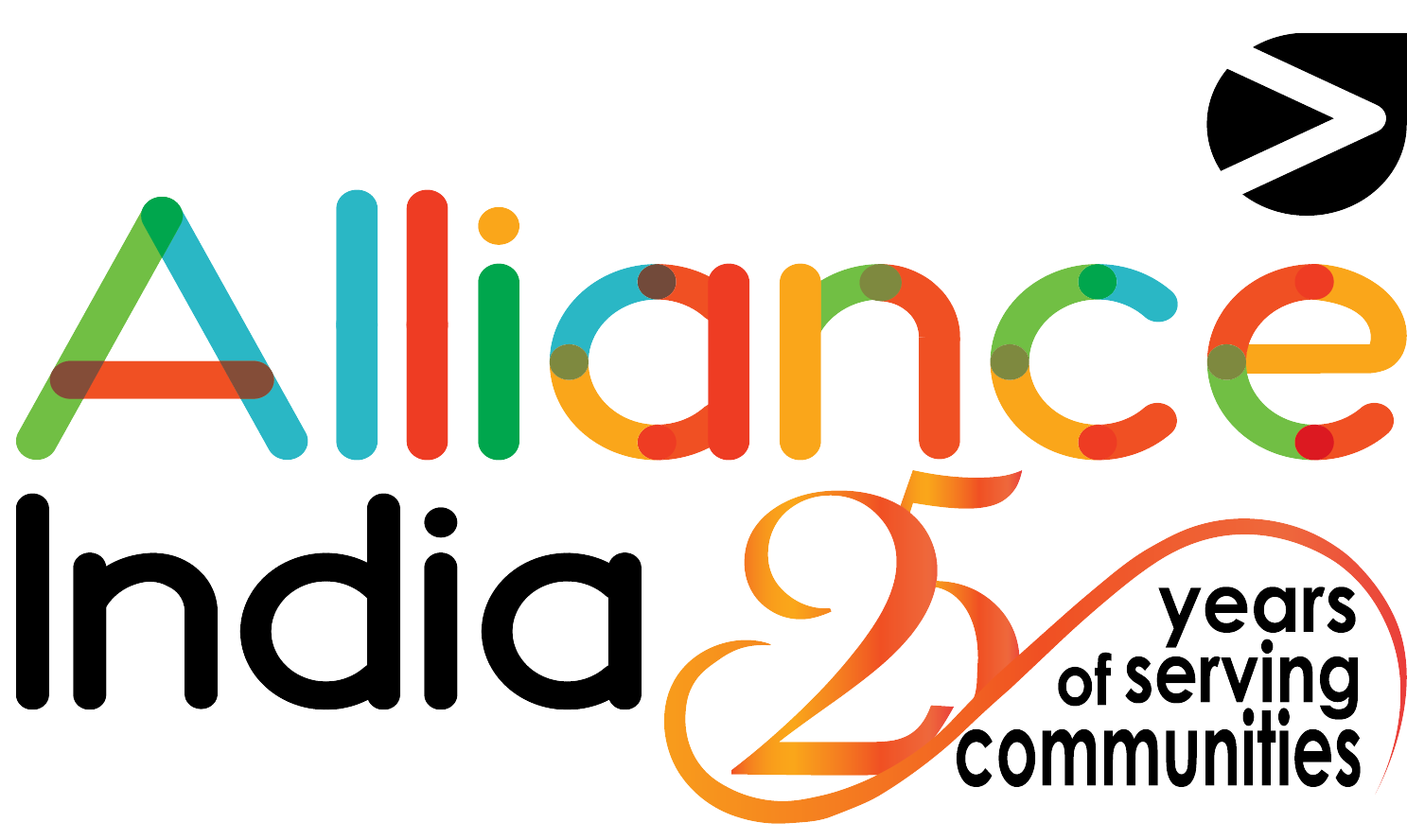- Our Work
Research
Research
Alliance India has focused on generating fresh evidence through robust programme data for evidence-based strategic planning and programme implementation to support HIV response in the country and achieve the global targets of 95-95-95. In the recent past, a special emphasis has been given to develop organizational capacity to design and implement research studies that allow our programs to devise programmatic pathways based on evidence, contribute to the national and regional knowledge on new and emerging aspects in HIV response and develop a better understanding of the existing issues which affect key affected communities we work with.

Current Research Studies
- Study to understand the role of stigma on antiretroviral initiation and retention among HIV Positive MSM and TGW+H in India. Year in which started: 2020
Alliance India is implementing the study across 11 states (Andhra Pradesh, Uttar Pradesh, Madhya Pradesh, Gujarat, Maharashtra, Rajasthan, Punjab, Delhi, West Bengal, Karnataka, Tamil Nadu) to understand the role of stigma on antiretroviral initiation, retention and engagement in care for HIV Positive MSM and TGW+H in India. The study is being implemented with support from Albert Einstein College of Medicine and National Institute of Health (NIH), USA.
The primary objective of the study is to characterize the prevalence and change over time of multiple stigmas in a cohort of newly diagnosed Indian MSM/ TGW+H and explore potential differences in levels and types of stigmas between MSM and TGW+H to inform future intervention development.
Study results will help for National AIDS Control Organization (NACO) and India’s Care and Support Program Vihaan run by Alliance India to identify possible areas of intervention and design appropriate strategies to reduce stigma and discrimination within the healthcare settings
2. Study to understand the feasibility of Oral TDF-containing PrEP, administered, once-daily orally to men having sex with men (MSM) and transgenders (TGs) in India.
Year in which started: 2019
PrEP (pre-exposure prophylaxis) is a medicine which people at risk for HIV take to prevent themselves from getting infected with HIV. PrEP is one of the HIV prevention methods among others such as condoms. Alliance India is implementing this study in collaboration with the Indian Council of Medical Research (ICMR), National AIDS Research Institute (NARI) and Shaan Foundation, Punjab. The study will explore the best possible mechanisms of PrEP dispensing i.e. community based or clinic-based for MSM and TGW+H population for daily oral-TDF containing PrEP. The study will also explore the usage of other HIV prevention options and change in risk perceptions and behaviour during or in the absence of Oral TDF-containing PrEP. Among other aspects, willingness to pay for PrEP at subsidized cost and facilitators and barriers of PrEP use will also be assessed among the study population. The findings from the study will support the government of India particularly NACO in the development of national guidelines for PrEP dispensing.
3. Study to assess Psychoactive Substance use on HIV Risk among MSM and TGW+H Population in India.
Year in which started: 2021
Evidence from national-level surveys and other studies have reported that key populations of MSM/TGW who use psychoactive substances especially injecting drug users are 2-7 times at risk of contracting HIV. Even other countries report that this risk is at least 30 times when psychoactive substances are used before sexual intercourse. Taking this into account, Alliance India with support from Frontline AIDS is implementing a study to assess the associations of psychoactive substance use and HIV risk among MSM and TGW+H population. The objectives of the study are to understand the multilevel associations (individual, group, community and societal) between substance use and HIV and also to use these findings to develop a policy document that focuses on this intersectionality of substance use, gender identity and sexual risk behaviour on HIV risk. The study is implemented in the states of Delhi-NCR, Telangana & Andra Pradesh, Punjab, Gujarat, West Bengal and Uttar Pradesh and will help Alliance India and NACO in developing appropriate interventions for the MSM and TGW+H who use drugs.
Completed Research Studies
- Assess the prevalence of active TB and service gaps among people who use drugs (Year: 2020)
- Situational Assessment & Baseline on the strengthening integration of sexual and reproductive health (SRH) and HIV services in Sampoorna Project, Gujarat (Year: 2020)
- Situational Assessment to Identify Gaps and SRH Needs of the Transgender Communities in the States of: Jharkhand, Delhi-NCR, Uttarakhand and Uttar Pradesh – Wajood Phase-3 (Year: 2020)
- End line Evaluation of Project:Harm Reduction Advocacy in Asia (Year: 2020)
- End line Assessment of Wajood Program, Phase-II (Year: 2019)
- Rates of non-fatal opioid overdose among people who inject drugs in Delhi: A cross-sectional study (Year: 2019)
- Ujwala Endline study (Year: 2019)
- Reducing Gender-based Violence/Intimate Partner Violence and HIV prevention among Women Who Use Drugs (WUDs) in India (Year: 2018)
- Easy to reach difficult to practice: Experiences of evidence-based programme management (To carry out data analysis for KP groups to effectively strategize prevention, care and treatment interventions and equip evidence-based monitoring to establish GIS maps in the three states) (Year: 2018)
- Impact Assessment Study under “Piloting Different Ways of Measure Outcomes” Long Term Impact Assessment of Programme titled “Pehchan” (Year: 2018)
- Mid-line assessment of programme on Strengthening community-led responses to mitigate violence and support empowerment as a strategy to enhance access to sexual health (Wajood) (Year: 2017)
- Acceptability of HIV Pre-Exposure Prophylaxis (PrEP) among hijras and other transgender women in India: Implications for PrEP programmes (Baseline) (Year: 2017)
- Experiences and learning from ABHAYA, an HIV-SRH integrated project for Female Sex Workers & Regular Partners in India (Year: 2016)
- Action research under project Pehchan to encourage reporting and mitigation of intimate partner violence against MSM, transgender and Hijra (MTH) individuals (Year: 2015)
- End line survey of Pehchan (Year: 2015)
- Qualitative Impact Assessment of Pehchan Programme (Year: 2015)
- Baseline Situational Analysis under Wajood Programme: Assessment of Sexual Health and Social Welfare Access Among Transgender Women and Hijras (Year: 2015)
- Acceptability of HIV Pre-Exposure Prophylaxis (PrEP) among hijras and other transgender women in India: Implications for PrEP programmes (End-line) (Year: 2017)
- Harm Reduction Advocacy in Asia (HRAsia)-Baseline (Year: 2017)
- Nirantar – Developing capacity in civil society organisations to improve access to HIV services and reduce vulnerability among key populations (Year: 2017)
- Samarth – Friendly and responsive HIV Testing Clinics for MSM, Transgender and Hijras (Year: 2017)
- Vihaan – Increasing treatment adherence, reducing stigma and discrimination, and improving the quality of life of people living with HIV (Year: 2017)
- Beyond engagement and participation: Community-led monitoring to bridge gaps in HIV care continuum services among People Who Inject Drugs (PWID) in India (Year: 2017)
- Pehchan operational research (Year: 2015)
- Made by Nicdark - Copyright 2020
- donations@ong.com
- volunteers@ong.com
- contact@ong.com
India HIV/AIDS Alliance (Alliance India)
A not-for-profit Section 8 Company with Registration No: U85310DL1999NPL098570
Contact
-
6, Community Centre
Zamrudpur Kailash Colony Extension
New Delhi – 110048 - +91-11-4536-7700
Download
Quick links
©2021 All Rights Reserved by Alliance India

